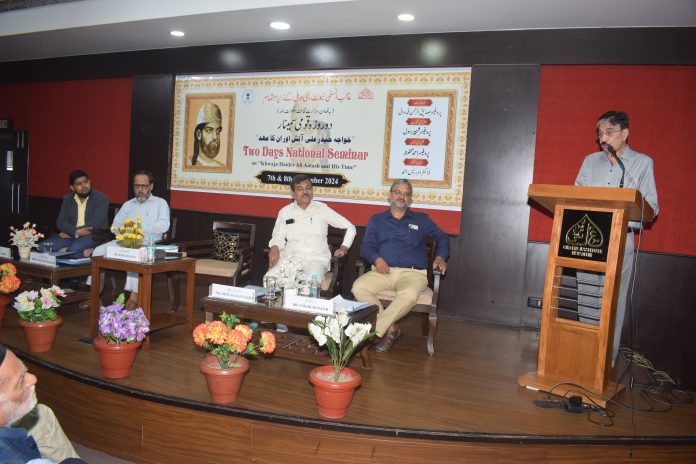New Delhi, Sep 8: The two-day national seminar on “Khwaja Haider Ali Aatish and His Era,” organized by the Ghalib Institute, concluded today with great enthusiasm. The seminar witnessed four literary sessions on its final day, focusing on the life and works of the esteemed Urdu poet, Khwaja Haider Ali Aatish.
The first session was presided over by Professor Naseem Ahmed, former Head of the Urdu Department at Banaras Hindu University. In his address, Professor Ahmed highlighted the unique significance of Aatish’s poetry within the broader tradition of Urdu literature. He emphasized that a poet’s true study requires understanding the entire literary tradition leading up to them, rather than just their individual work. Papers presented in this session included “The Influence of Persian Poetry on Aatish’s Work” by Professor Aleem Ashraf, “From Subjectivity to Mysticism in Aatish’s Poetry” by Dr. Mushtaq Sadaf, “Aatish’s Student Diya Shankar Naseem” by Dr. Ibrahim Afsar, and “The Mystical Poetry of Aatish” by Dr. Shadab Shamim.
The second session was chaired by Dr. Khalid Alvi, who in his presidential address, discussed the common trend of comparing Aatish with Nasikh. He argued that such comparisons are often misplaced and can be traced back to a letter by Ghalib, where he remarked that certain types of verses were more commonly found in Aatish’s work than in Nasikh’s. The session included insightful presentations on topics such as “An Analysis of Aatish’s Ghazal” by Professor Kausar Mazhari, “Language and Expression in Aatish’s Poetry” by Dr. Umair Manzar, “Misinterpretations of Aatish’s Work” by Dr. Sibte Hassan, and “The Literary Rivalry between Nasikh and Aatish” by Dr. Abdul Bari.
The third session was presided over by Professor Aleem Ashraf, Head of the Persian Department at Delhi University. In his remarks, Professor Ashraf spoke about the role of mysticism in Urdu poetry, noting that while it is deeply ingrained in the tradition, poets sometimes maintain a distance from it. He cautioned against imposing a singular interpretative framework on the entire poetic tradition. Presentations in this session included “Aatish in Literary Biographies and Books” by Professor Naseem Ahmed, “The Influence of Persian Tradition on Aatish’s Poetry” by Professor Iraq Raza Zaidi, and “A Critical Overview of Aatish’s Disciples” by Dr. Muhammad Muqeem.
The fourth and final session was chaired by Professor Moinuddin Jinabade, who addressed the significance of regional literary schools, emphasizing that they should not be viewed negatively. He explained that each school reflects the unique tastes and standards of its region. With the rise of Lucknow as a cultural hub, it developed its own distinct literary standards, separate from those of Delhi. The session featured papers such as “Khwaja Haider Ali Aatish” by Professor Khwaja Muhammad Ikramuddin and “Critiques of Aatish’s Work: An Overview” by Dr. Amir Hamza.
ALSO READ: National Seminar on ‘Khwaja Haider Ali Atish and His Era’ Highlights Atish’s Enduring Influence
In his closing remarks, Dr. Idrees Ahmad, Director of the Ghalib Institute, expressed his delight at the participants’ keen interest and engagement, particularly noting the large number of students who remained until the final session. He thanked the attendees, stating that their participation was crucial to the seminar’s success.
The seminar provided an in-depth exploration of Khwaja Haider Ali Aatish’s contributions to Urdu poetry, reaffirming his lasting impact on the literary tradition.




